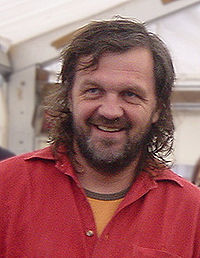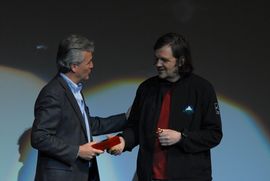Emir Kusturica
| Emir Kusturica | |
|---|---|
 |
|
| Born | Emir Kusturica 24 November 1954 Sarajevo, SR Bosnia and Herzegovina, SFR Yugoslavia |
| Nationality | Serbian |
| Other names | Nemanja |
| Occupation | Film director and screenwriter |
| Years active | 1978–present |
| Spouse | Maja Kusturica |
| Children | Stribor Kusturica, Dunja Kusturica |
Emir Nemanja Kusturica (Serbian Cyrillic: Емир Немања Кустурица), (born 24 November 1954) is a Serbian[1][2][3] filmmaker, actor and musician with a string of internationally acclaimed features.
He won the Palme d'Or at Cannes twice (for When Father Was Away on Business and Underground), and he is also a recipient of the French Ordre des Arts et des Lettres.[4][5] On 8 September 2007, Kusturica became a UNICEF National Ambassador for Serbia, alongside Ana Ivanović, Jelena Janković and Aleksandar Đorđević. Kusturica resides in Drvengrad, a village he had built for his film Life Is a Miracle.
Contents |
Life and work
Early life and works
Born to Murat Kusturica (a journalist employed at the SR Bosnia and Herzegovina Secretariat of Information) and Senka Numankadić (a court secretary),[6] young Emir grew up as the only child of a secular Bosnian Muslim family in the Sarajevo neighbourhood of Gorica.[7]
After graduating from the Film Faculty of the Academy of Performing Arts in Prague (FAMU) in 1978, Kusturica began directing made-for-TV television shorts in the former Yugoslavia. He made his feature film debut in 1981 with Do You Remember Dolly Bell?, which won the prestigious Golden Lion for Best First Work at that year's Venice Film Festival. From 1981 to 1988 he was a lecturer at the Academy of Performing Arts in Sarajevo (Akademija Scenskih Umjetnosti) and art director of Open Stage Obala (Otvorena scena Obala).
His second feature film, When Father Was Away on Business (1985), earned a Palme d'Or at Cannes and five Yugoslavian movie awards, as well as being nominated for an American Academy Award for Best Foreign Film. He wrote the screenplays for both Do You Remember Dolly Bell? and When Father Was Away on Business in collaboration with Abdulah Sidran. In 1989, Kusturica earned even more accolades for Time of the Gypsies, a film about gypsy culture and the exploitation of their youth.
1990s
Kusturica continued to make highly regarded films into the next decade, including his American debut, the absurdist comedy Arizona Dream (1993) and the Palme d'Or-winning black comedic epic, Underground (1995), based upon a scenario of Dušan Kovačević, famous Serbian playwright.[8]
In 1998, he won the Venice Film Festival's Silver Lion for Best Direction for Black Cat, White Cat, a farcical comedy set in a Gypsy (Romany) settlement on the banks of the Danube. The music for the film was composed by the Belgrade-based band No Smoking Orchestra.
Recent life and work
- In 2001, Kusturica directed Super 8 Stories, a documentary road and concert movie about The No Smoking Orchestra, of which he is a band member.
- His film, Maradona a documentary on Argentine soccer star Diego Maradona, was originally released in Italy in May 2007. It was premiered in France during the Cannes Film Festival in 2008.
- His film Promise Me This premeried at the 2007 Cannes Film Festival.[9]
He was President of the Jury of the 2005 Cannes Film Festival.
- In 2007, Kusturica prepared a punk opera, Times of the Gypsies. The premiere took place in June 2007, at the Opéra Bastille in Paris.
- In July 2007, Kusturica directed the accompanying music video to Manu Chao's single "Rainin In Paradize", from the latter's forthcoming album.
- In mid-December 2007, Kusturica announced the formation of Kustendorf Film Festival.[10] Its first instalment was held at Kusturica's village from 14 January to 21 January 2008.
- Since January 2008, Kusturica annually organizes his own private Küstendorf Film Festival.
- His next film will be Cool Water, a comedy against the background of the Middle East conflict. Shooting will start in November 2010 in Germany. It is the first time that Emir Kusturica directs a film which is not written by himself.
Acting
Kusturica made his first acting appearance in The Widow of St. Pierre 2000, a movie by director Patrice Leconte. In 2002, Emir Kusturica appeared as an electric guitar player/security specialist in The Good Thief, directed by Neil Jordan.
He played the role of Russian KGB agent Colonel Sergei Gregoriev, the central focus of a web of intrigue between warring governments and rival spy agencies, with effortless charisma, authority and humor, in the 2009 French movie L'affaire Farewell.
Music

In 1986–1988, Kusturica played bass guitar in Zabranjeno Pušenje, a rock band from Sarajevo (SR Bosnia and Herzegovina).
Although Kusturica played a minor musical role in the band, it changed its name to Emir Kusturica & No Smoking Orchestra. In 1999, the No Smoking Orchestra recorded a new album, Unza Unza Time, produced by the Universal record company, as well as a music video, directed by Emir Kusturica. The band has toured internationally.
The musician and composer Goran Bregović also created music for several Kusturica's films, including Time of the Gypsies, Arizona Dream, which featured Iggy Pop, and Underground.
Controversy
Work
Kusturica as well as his work remains controversial at home and abroad.[11] Underground, scripted by Dušan Kovačević, was partly financed by state-owned Serbian television and created controversy. The film detailed the history of Yugoslavia from the beginning of the second World War until the conflict in the 1990s. Some critics claimed Kusturica propagated a pro-Serbian view of the Yugoslav Wars including animosities during WWII.[12] Some intellectuals claimed the film contained pro-Serb propaganda.[13][14]
French philosopher and writer Alain Finkielkraut denounced the Cannes Film Festival's jury saying that "In recognizing Underground, the Cannes jury thought it was honouring a creator with a thriving imagination. In fact, it has honoured a servile and flashy illustrator of criminal clichés. The Cannes jury highly praised a version of the most hackneyed and deceitful Serb propaganda. The devil himself could not have conceived so cruel an outrage against Bosnia, nor such a grotesque epilogue to Western incompetence and frivolity."[14][15] It was later revealed that Finkielkraut had not even seen the film when he wrote this piece.[16][17][18][19] French philosopher Bernard-Henri Lévy made a film criticizing Underground.[13]
The Slovenian philosopher Slavoj Žižek said that "I hope we share another point, which is – to be brutal – hatred of [director] Emir Kusturica. 'Underground' is one of the most horrible films that I've seen. What kind of Yugoslav society do you see in Kusturica's Underground? A society where people fornicate, drink, fight – a kind of eternal orgy."[20]
For Bosnian novelist Aleksandar Hemon, who was born in Sarajevo and now living and writing in United State of America where he moved before the war, Underground downplays Serbian atrocities by presenting "the Balkan war as a product of collective, innate, savage madness."[21]
Politics
Kusturica has been criticised for going along with Slobodan Milošević’s propaganda during the Bosnian War. Andrej Nikolaidis, a Montenegrin writer, stated: "Considering he proclaimed his dead father a Serb, and himself, Emir, an Orthodox Christian, he easily chose his own in the Bosnian War. He recognized them in Radovan Karadžić and Ratko Mladić. He wasn't there to fire cannon barrages, but whenever he could, with his artistic and media get-up he provided them an alibi for every killed Muslim who didn't want to admit that he was originally an 'Orthodox Christian'." The journalist supported his claims by quoting Kusturica's numerous pro-Milošević public statements as well as with photos showing Kusturica hugging Jovica Stanišić (chief of Serbian State Security Service, today tried for war crimes in the Hague), Milorad Vučelić (director of Serbian television ) and Zoran Lilić (at the time president of Yugoslavia).[11] Kusturica sued Nikolaidis and the Monitor newspaper for damage to his reputation at the Supreme Court of Montenegro, resulting in them being fined 12,000 euros for breaking the codex of journalism by calling him stupid, ugly and corrupt in the article.[22] The trial provoked a petition organized by the Bosnian Writers Association, calling for the recall of the verdict, because they felt it denied basic human rights (of free speech), as they feel that Nikolaidis was merely publicly saying what everybody who lived in Balkans during the nineties already knew, i.e., that there had been collaboration between Emir Kusturica and the regime of Slobodan Milošević. The petition was supported and signed by prominent intellectuals and many students from former Yugoslavia and abroad.[11]
Personal

On Đurđevdan (St. George's Day) in 2005 Emir was baptised into the Serbian Orthodox Church as Nemanja Kusturica (Немања Кустурица) in Savina monastery near Herceg Novi, Montenegro.[23][24] To his critics who considered this the final betrayal of his Bosnian Muslim roots, he replied that: "My father was an atheist and he always described himself as a Serb. OK, maybe we were Muslim for 250 years, but we were Orthodox before that and deep down we were always Serbs, religion cannot change that. We only became Muslims to survive the Turks."[23][25]
At the 2007 parliamentary elections he gave indirect support to Prime Minister Vojislav Koštunica and his center-right Democratic Party of Serbia.[26] In 2007, he also supported Serbian campaign Solidarity - Kosovo is Serbia, a campaign against the unilateral separation of Serbian province of Kosovo.[27]
He is currently living in Drvengrad, Serbia, the village he had built for his film Life Is a Miracle.
Kusturica holds Serbian and French citizenships.
Emir Kusturica is married to Maja Kusturica with whom he has two children.[28]
Filmography
- Guernica, 1978, short
- The Brides Are Coming (Nevjeste dolaze), 1978, TV film
- Buffet Titanic (Bife Titanik), 1979, TV film
- Do You Remember Dolly Bell? (Sjećaš li se Dolly Bell), 1981
- When Father Was Away on Business (Otac na službenom putu), 1985
- Time of the Gypsies (Dom za vešanje), 1988
- Arizona Dream, 1993
- Underground (Podzemlje), 1995
- Black Cat, White Cat (Crna mačka, beli mačor), 1998
- Super 8 Stories, 2001, documentary
- Life Is a Miracle (Život je čudo), 2004
- Promise Me This (Zavet), 2007
- Maradona, 2008, documentary
- L'affaire Farewell (Farewell), 2010
- Cool Water, 2011
- Tweaker's Delight, 2011
- Wild Roses, Tender Roses, 2012
Awards
- 1st prize on Student's Film Festival in Karlovy Vary, (1978) for Guernica
- Golden Lion for "Best First Work" in Venice Film Festival, (1981) for Do You Remember Dolly Bell?
- Golden palm Cannes Film Festival, (1985) for When Father Was Away on Business
- FIPRESCI prize Cannes Film Festival, (1985) for When Father Was Away on Business
- Best Foreign Language Academy Award Nomination, (1985) for When Father Was Away on Business
- Best Director award at Cannes Film Festival, (1989) for Time of Gypsies[29]
- Silver Bear at Berlin Film Festival, (1993) for Arizona Dream
- Golden Palm at Cannes Film Festival, (1995) for Underground[30]
- Silver Plate of best documentary at Chicago International Film Festival, (2001) for Super 8 Stories
- Cinema Prize of the French Education System at Cannes Festival (2004) for Life is a Miracle
- Best European Union Film at César Awards, (2005) for Life is a Miracle
- Philippe Rotthier European Architecture Award, (2005) for Küstendorf village in Serbia
- On 10 February 2007, Kusturica received Ordre des Arts et des Lettres, France's highest order in recognition of significant contribution to the arts.
- Emir Kusturica is the winner of the Philippe Rotthier European Architecture Award for his Küstendorf ethnic village project (also called Drvengrad – a “wooden town”) on Mt. Zlatibor, Serbia, in 2005. The prize is awarded every three years by the Brussels Foundation for Architecture.
- In 2004, The Prix de l'Education nationale (National Education Prize) honored Emir Kusturica and his film Život je čudo (Life is a Miracle).
Notes
- ↑ Movie-maker, musician, architect: Emir Kusturica is coming to London "The Serbian movie-maker has built his own village and starred with the No Smoking Orchestra" by David Hutcheon, TIMES, May 2, 2009
- ↑ Finding roots in a reel Balkan village – Bosnian-born director Emir Kusturica builds a small town celebrating his embrace of a Serbian identity by Tracy Wilkinson, August 13, 2007
- ↑ Kustu.com – Official Web Site Biography
- ↑ "Politika". Politika.rs. http://www.politika.rs/detaljno.php?nid=19321. Retrieved 2010-04-02.
- ↑ "Ministere de la culture". Culture.gouv.fr. http://www.culture.gouv.fr/culture/actualites/index.htm. Retrieved 2010-04-02.
- ↑ Croatia. "INTERVIEW: EMIR NEMANJA KUSTURICA, ''Globus'', February 2009". Globus.com.hr. http://www.globus.com.hr/Clanak.aspx?BrojID=307&ClanakID=8519&Stranica=4#. Retrieved 2010-04-02.
- ↑ Halpern, Dan (8 May 2005). "The (Mis)Directions of Emir Kusturica". The New York Times. http://www.nytimes.com/2005/05/08/magazine/08EMIR.html?_r=1. Retrieved 29 March 2010.
- ↑ "Biography". Kustu.com. http://www.kustu.com/w2/en:biography. Retrieved 2010-04-02.
- ↑ "Festival de Cannes: Promise Me This". festival-cannes.com. http://www.festival-cannes.com/en/archives/ficheFilm/id/4429309/year/2007.html. Retrieved 2009-12-20.
- ↑ http://www.pressonline.co.yu/vest4.jsp?id=25799§ionId=42
- ↑ 11.0 11.1 11.2 "Emir Kusturica: Encyclopedia II – Emir Kusturica – Controversy". Experiencefestival.com. http://www.experiencefestival.com/a/Emir_Kusturica_-_Controversy/id/5020343. Retrieved 2010-04-02.
- ↑ "Emir Kusturica: Encyclopedia II – Emir Kusturica – Life and work". Experiencefestival.com. http://www.experiencefestival.com/a/Emir_Kusturica_-_Life_and_work/id/5020342. Retrieved 2010-04-02.
- ↑ 13.0 13.1 http://www.guardian.co.uk/world/2004/may/15/film.cannes20041 Serb director tries for third triumph
- ↑ 14.0 14.1 http://www.nytimes.com/1995/12/05/movies/dispute-leads-bosnian-to-quit-films.html Dispute Leads Bosnian to Quit Films
- ↑ "L'imposture Kusturica – Le Monde, 2 June 1995". Abonnes.lemonde.fr. http://abonnes.lemonde.fr/cgi-bin/ACHATS/ARCHIVES/archives.cgi?ID=a24525c9bbfba0d5e039152dda70deac7b7c1a68b97cb318. Retrieved 2010-04-02.
- ↑ "The polemic 'Underground'". Kustu.com. http://kustu.com/w2/en:polemics. Retrieved 2010-04-02.
- ↑ Cédric Housez,Voltaire. "Alain Finkielkraut and Bernard Henry Lévy, two propagandists of the «clash of civilizations» [Voltaire]". Voltairenet.org. http://www.voltairenet.org/article30277.html. Retrieved 2010-04-02.
- ↑ "Faut-il brûler Underground?". Lexpress.fr. 1995-10-19. http://www.lexpress.fr/informations/faut-il-bruler-underground_610275.html. Retrieved 2010-04-02.
- ↑ Notes from the underground: the ... – Google Books. Books.google.com. 1995-06-02. http://books.google.com/books?id=IDktuer8qcAC&lpg=PA42&ots=aRXRSjyxtH&dq=finkielkraut%20underground&pg=PA42#v=onepage&q=finkielkraut%20underground&f=false. Retrieved 2010-04-02.
- ↑ "Euronews: Slavoj Žižek interview". Youtube.com. 2008-09-13. http://www.youtube.com/watch?v=EzM8tqjmCU8. Retrieved 2010-04-02.
- ↑ Halpern, Dan (8 May 2005). "The (Mis)Directions of Emir Kusturica". The New York Times. http://www.nytimes.com/2005/05/08/magazine/08EMIR.html?pagewanted=2&_r=1. Retrieved 29 March 2010.
- ↑ "Blic Online | Vrhovni sud Crne Gore presudio u korist Kusturice". Blic.rs. http://www.blic.rs/hronika.php?id=110061. Retrieved 2010-04-02.
- ↑ 23.0 23.1 "Article about Kusturica's religion on". Pionirovglasnik.com. 2005-07-26. http://www.pionirovglasnik.com/index.php?category=39&content=315. Retrieved 2010-04-02.
- ↑ "News of Kusturica's baptism on passagen.se". Hem.passagen.se. http://hem.passagen.se/hambarine/Vijesti/23072005Kusturica.htm. Retrieved 2010-04-02.
- ↑ Emir Kusturica (2005-03-04). "An interview for Guardian". Film.guardian.co.uk. http://film.guardian.co.uk/interview/interviewpages/0,6737,1429569,00.html. Retrieved 2010-04-02.
- ↑ "(Reuters) – Film director Emir Kusturica attends the final pre-elections rally of Democratic Party of Serbia in Belgrade 17 January 2007". 2space.net. 1970-01-01. http://www.2space.net/news/article.php?art=15890&ut=1169058300. Retrieved 2010-04-02.
- ↑ Iva Martinović (2007-11-12). "Radio Slobodna Evropa article". Slobodnaevropa.org. http://www.slobodnaevropa.org/content/Article/719300.html. Retrieved 2010-04-02.
- ↑ Halpern, Dan (8 May 2005). "The (Mis)Directions of Emir Kusturica". The New York Times. http://www.nytimes.com/2005/05/08/magazine/08EMIR.html. Retrieved 29 March 2010.
- ↑ "Festival de Cannes: Time of the Gypsies". festival-cannes.com. http://www.festival-cannes.com/en/archives/ficheFilm/id/227/year/1989.html. Retrieved 2009-08-01.
- ↑ "Festival de Cannes: Underground". festival-cannes.com. http://www.festival-cannes.com/en/archives/ficheFilm/id/3377/year/1995.html. Retrieved 2009-09-05.
References
- Gocic, Goran: "The Cinema of Emir Kusturica: Notes from the Underground", Wallflower Press, London, 2001.
- Irodanova, Dina: Emir Kusturica. London. British Film Institute 2002.
- Imsirevic, Almir: "Based on a Truth Story", Sarajevo, 2007.
External links
- No Smoking Orchestra – Band official site
- Komuna Belgrade
- Interview with Kusturica on Black Cat, White Cat
- RTS interview, 26 April 2006 (Serbian)
- Etno selo Nemanje Kusturice na Mećavniku, May, 2007 – www.ciode.ca (Serbian)
|
||||||||||||||
|
||||||||
|
|||||